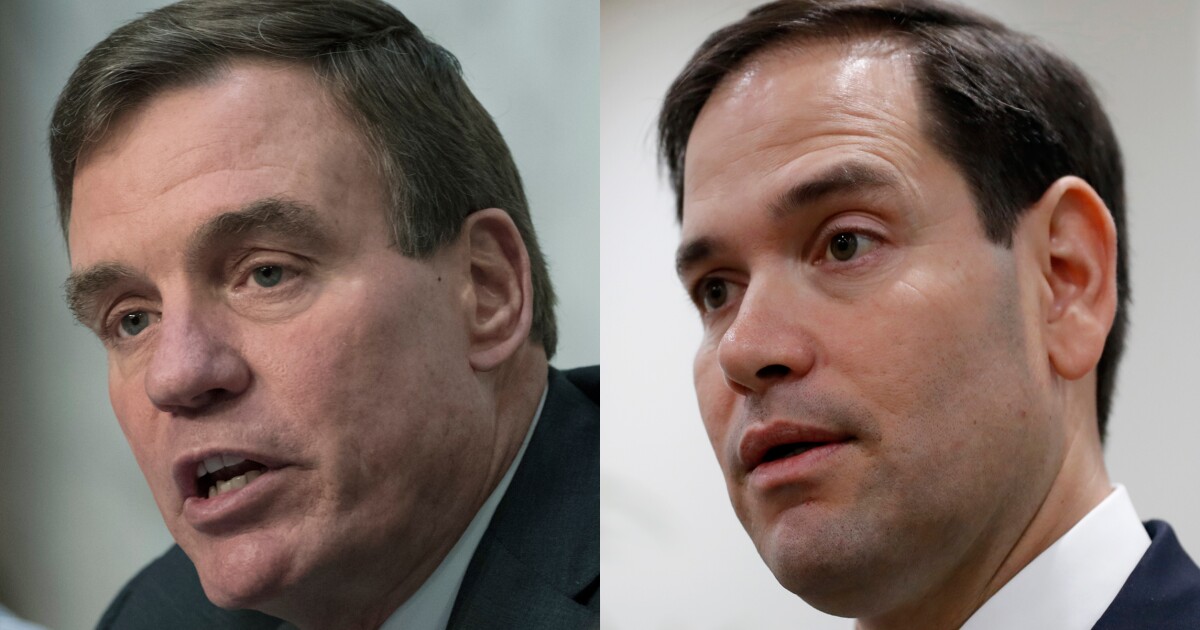

Senate Intelligence Committee members are eyeing ways to compel the Biden administration to share information about the classified documents found in the homes of former President Donald Trump and President Joe Biden after weeks of stonewalling.
Top lawmakers emerged from a classified briefing earlier this week unsatisfied by the answers they received from intelligence community and Justice Department officials. Their options for getting cooperation from those officials range from blocking nominees to threatening funding for key agencies.
RUBIO SAYS SENATE INTEL COMMITTEE ‘NO CLOSER’ ON CLASSIFIED DOCUMENTS AFTER GANG OF EIGHT BRIEFING
Sens. Mark Warner (D-VA), chairman of the Senate Intelligence Committee, and Marco Rubio (R-FL), its highest-ranking Republican, both hinted they would step up pressure on the Biden administration after the latest frustration.
“While today’s meeting helped shed some light on these issues, it left much to be desired and we will continue to press for full answers to our questions in accordance with our constitutional oversight obligations,” Warner and Rubio said in a joint statement after the briefing.
Officials delivered the briefing to the so-called Gang of Eight, which includes the top two leaders from each party in the House and Senate as well as the leaders of both chambers’ intelligence committees.
Warner and Rubio, however, have led the public charge for more answers from the Biden administration.
“I’ll talk to Warner about it and, obviously, our colleagues in the House as well. The intelligence agencies have a lot of requests outstanding to us,” Rubio told reporters on Wednesday. “I think that’s a partnership, and if they make it difficult for us to do our jobs, we’ll find ways to sort of make sure there’s some balance in our relationship.”
Justice Department and intelligence officials have said the appointment of special counsels in both the Trump and Biden cases precludes them from sharing information about the documents with Congress.
But Senate Intelligence lawmakers have said they have no interest in examining the legal exposure of Trump or Biden in those cases. Their only concern, they have said, is with the risks to national security that any of the classified documents may have posed if the wrong people encountered that information.
Targeting intelligence community funding could be one option for lawmakers if the Biden administration continues to block access to the documents.
Rubio stopped short of threatening the intelligence budget outright in late January, but he maintained it as a potential path forward if the stonewalling continued.
“I’m not in the threat business right now, but certainly there are things we need to do as a committee every year to authorize the moving around of funds,” he said. “I’d prefer not to go down that road, but it’s one of the pieces of leverage we have as Congress.”
Lawmakers in the House are preparing to pursue spending negotiations as Republicans flex their muscles in the majority by demanding cuts in exchange for their support of a debt ceiling increase.
With those talks set to come to a head in the next several months, Republicans could have an opening to press for more cooperation on the classified document cases.
Senate lawmakers could subpoena top officials if talks about accommodating the Senate Intelligence Committee’s oversight requests do not bear fruit.
House Republicans have already begun the subpoena process in investigations they have found difficult to advance without cooperation.
House Judiciary Chairman Jim Jordan (R-OH), for example, has already sent subpoenas to Attorney General Merrick Garland, FBI Director Christopher Wray, and others in an investigation of the Biden administration’s treatment of parents who spoke up at school board meetings.
Subpoenas would represent an adversarial step in the quest for Senate lawmakers looking for information in the classified documents cases, and may not be the preferred course of Democrats in charge of committees in the upper chamber, but could elevate Senate lawmakers’ demands to a more urgent level.
Senate lawmakers could also threaten some Biden administration nominees if the stonewalling continues.
While opposition to most presidential appointees is partisan or relates to objections specific to a nominee, senators could block confirmation votes until administration officials come to the table.
Spokespeople for Warner and Rubio did not comment on the next steps for the committee.
CLICK HERE TO READ MORE FROM THE WASHINGTON EXAMINER
Senate Intelligence members have said they need to see the classified documents recovered from the Trump and Biden homes because they want to perform oversight of how the intelligence community mitigated the risks those documents may have posed if exposed.
That includes a review of whether the documents may have jeopardized intelligence-gathering methods or whether the information itself was recent enough to pose threats if published.






